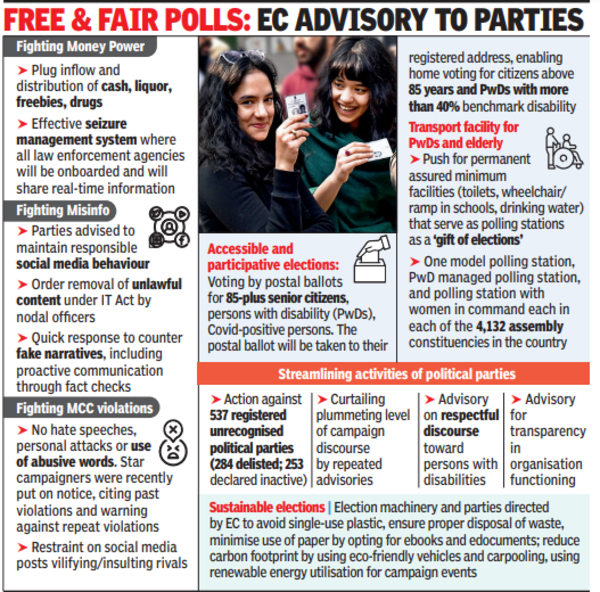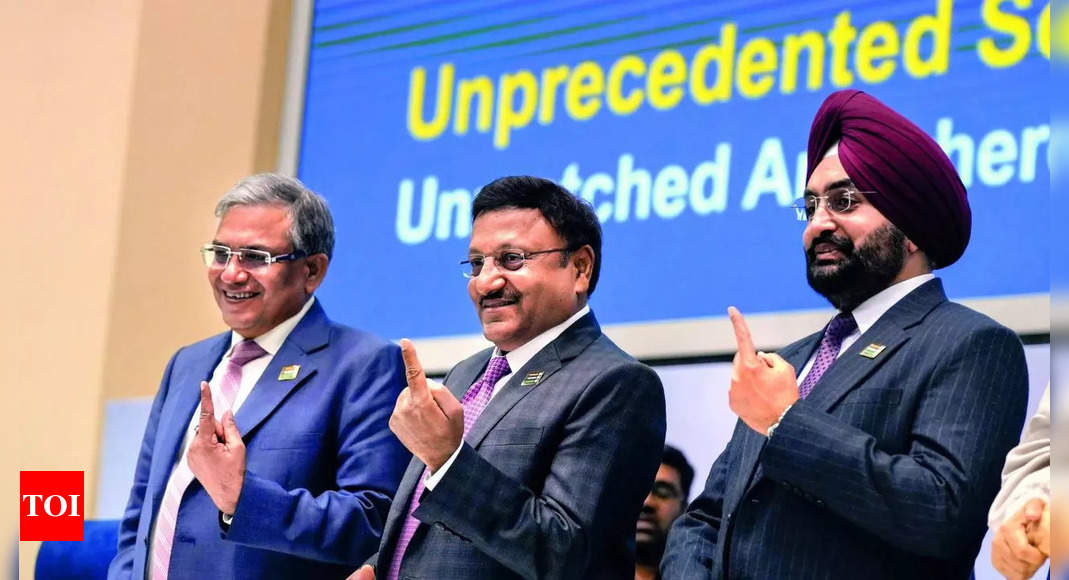[ad_1]
Though assembly polls in Jammu and Kashmir are also due, with Supreme Court directing Election Commission to hold them no later than Sept 30, Kumar said they will be held only after the Lok Sabha polls.

He explained that simultaneous polls would have required an additional 450-500 companies, or up to 50,000 personnel, to secure all candidates across 90 assembly seats. “That many forces are not available (as of now) but EC stands committed to holding J&K poll at the earliest,” he said.
TOI had on Saturday reported that elections in Jammu and Kashmir would not be clubbed with general elections due to reasons related to force logistics, given that a far larger number of candidates need to be given security.
Polls in Jammu and Kashmir will be held over five phases, with each constituency voting in a different phase. Unlike last time, when polling in terror-hit Anantnag parliamentary constituency, in a first, was held over three phases, no such arrangement was necessitated this time.
However, a similar arrangement has been adopted for Outer Manipur (ST) parliamentary seat comprising largely hill areas of the state that has seen intermittent ethnic violence since May last year. Of the total 28 assembly segments, 15 will witness polling on April 19 and the remaining 13 on April 26. People living in relief camps in violence-hit Manipur will be allowed to vote from polling stations set up in the camp itself, the CEC said.
West Bengal, Bihar and Uttar Pradesh will vote in all seven phases. Election Commission had earlier requisitioned the largest chunk of 900 companies of central forces, comprising around 90,000 personnel, for deployment in poll violence-prone Bengal.
Kumar said as per a practice introduced ahead of polls to five states including Bengal in 2021, there will be randomisation of state police and central forces, and their deployment decided by a committee comprising the chief electoral officer, state police nodal officer and state CAPF coordinator, to ensure their optimum and effective utilisation in the interest of free and fair polls.
Nearly 96.8 crore citizens are eligible to vote at a total 10.5 lakh polling stations across the country. The electorate includes 49.7 crore male voters and 47.1 crore voters. Women voters exceed men in a dozen states/UTs. There are 21.5 crore voters in the 18-29 age group, of which 1.8 crore are in the 18-19 years.
Chief election commissioner appealed to voters to help better the 67% voter turnout recorded in 2019. He said EC’s aim was to hold peaceful, inducement-free and impartial polls with near-zero repolls.
There will be a 24×7 integrated control room in every district, with a senior officer assigned to monitor feeds from TV, social media, webcasting, 1950 voter helpline, grievances portal and cVIGIL app in real time. There will be drone-based checks at borders, surveillance of chartered flights and bar on movement of ATM cash after sunset, as part of measures to check movement of illegal cash, liquor, drugs and freebies.
Election Commission is apprehensive of illegal cash making a big comeback in poll funding in view of the scrapping of electoral bonds. It has alerted all law enforcement and intelligence agencies to tighten surveillance.
EC will be closely watching out for any instances of model code violations, including use of intemperate language against rivals and hate speeches, particularly by star campaigners, as well as fake news and false narratives. It has deployed 2,100 observers to act as its eyes and ears and report any breaches.
[ad_2]
Source link

